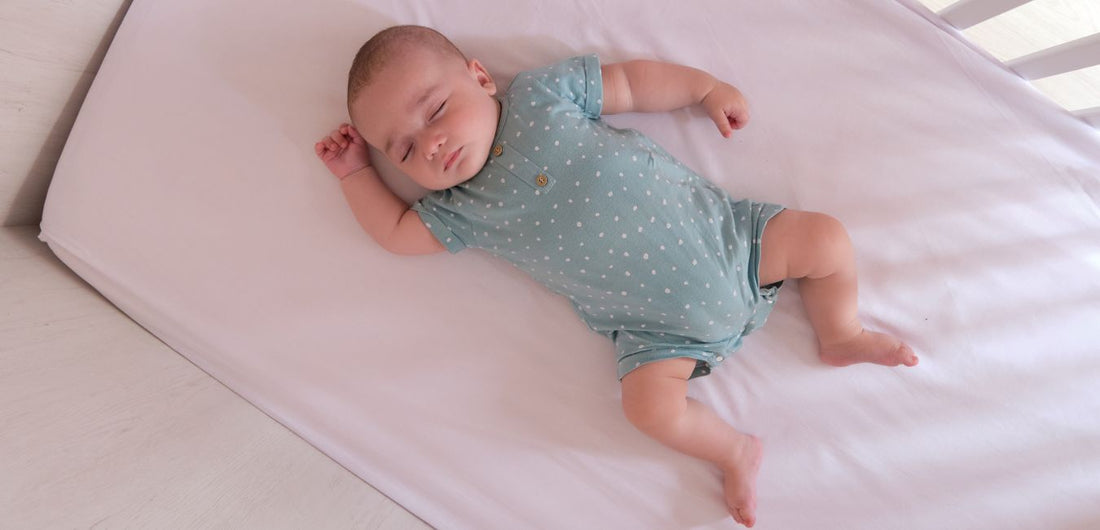What is sleep training?
Sleep training is a way to help babies and toddlers to establish healthy sleep patterns and develop the ability to drift off to sleep independently. A holistic approach to sleep training considers all factors that may affect a child's sleep quality. This includes implementing consistent pre-sleep routines, following age-appropriate schedules or wake windows, creating a sleep-conducive environment, ensuring appropriate clothing for the temperature, and introducing a new settling method that allows a baby or toddler to build their confidence in falling asleep independently, tailored to their age and needs.
The ultimate goal of sleep training is for a baby or toddler to feel at ease sleeping in their own cot and sleep soundly night and day. If they happen to wake up, they'll confidently know how to return to sleep without requiring assistance. Some sleep training methods can enable babies to achieve independent sleep within a couple of days.
What sleep training isn't:
Sleep training is often mistakenly associated with the "cry it out" method, but that is just one approach among many. There are various sleep training methods, and we do NOT use "Cry it Out" in our sleep plans.
Why do people sleep train?
Not all babies are naturally great sleepers, and many start struggling with sleep even with parental assistance. This can lead to disrupted sleepless nights for all.
There are also recommended sleep totals for babies to ensure healthy development, and not all babies achieve this even with parental help. Successful sleep training can lead to babies sleeping soundly for 10-13 hours at night and taking longer daytime naps.
Studies also show that sleep impacts almost every aspect of health. When a baby sleeps, their cortisol levels drop, growth hormones are released, their immune system strengthens, their appetite regulates, and new learning is consolidated to memory.
For parents, quality sleep is linked to reduced anxiety, improved memory, decreased irritability, and a lower risk of postpartum depression. Improved sleep leads to a better quality of life for the entire family.
When is the earliest age to start sleep training?
While you can gently shape new sleep habits even in the newborn phase most newborn babies will still need some help to fall asleep - and can still sleep really well without sleep training.
So we recommend waiting until at least 4 months old. At this point, the Moro reflex has subsided, and you can transition from a swaddle to a sleeping bag so babies can access their hands to soothe, and their establishing circadian rhythm helps to make sleep more predictable.
Some consultants advise waiting until 6 months, mainly because it's the age when many babies can technically sleep through the night without needing a feed. Whereas we usually work with clients on independent sleep skills while still allowing at least one feed per night - especially for babies under 7 months of age.
Another reason for the 6-month recommendation is the use of the "cry it out" method, which involves leaving a child in their cot without returning to them, regardless of how much they cry - we do not use this method.
We prefer gentler, responsive methods that are just as effective without causing added stress to parents, allowing us to work on independent sleep skills from a younger age.
What is the best age for sleep training?
The "sweet spot" for sleep training is typically between 6 and 11 months. At this age, a baby's circadian rhythm is well-established, making it easier to follow a consistent daily routine. They are usually not too attached to their current way of falling asleep and are receptive to change.
Most babies start falling asleep independently within a couple of days and begin sleeping through the night, with longer naps to follow.
You can also use a large variety of sleep training methods at this age and most babies still respond well to hands on ‘gentle’ sleep training methods without being too overstimulated by parent presence.
When is the most challenging age for sleep training?
The most challenging age for shaping sleep habits is typically between 18 months and 2.5 years. During this period, children transition from babies to toddlers and exhibit increased stamina and big emotions.
They can be really attached to their existing routines making change more difficult for them. They also have less sleep pressure than when they were infants, making it common for them to skip naps entirely when no longer assisted to sleep.
It's still possible to work on sleep at this age, but it's crucial to have a well-prepared plan, be consistent, and opt for a gradual approach, especially if you’re tackling this alone without the support of a sleep consultant.
Should I wait for my baby to pass through their current sleep regression?
No, don’t wait! As they may never truly leave a regression. The 4 month sleep regression in particular, is actually a progression and a permanent change to sleep biology.
Plus studies show that sleep problems and poor sleep habits during infancy (without management) will likely continue well into preschool years. So most parents will need to change their approach to sleep at some stage to see improvements.
“Of children aged 15 - 48 months who had sleep disturbances at the initial interview, 84% had persistence of sleep disturbances after 3 years.” Persistence of sleep disturbances in preschool children. S Kataria, M S Swanson, G E Trevathan
My child is teething; should I wait to sleep train?
Parents will often think they’re child is teething long before a tooth actually appears. And sometimes what parents think is fussiness due to teeth is actually fussiness due to lack of sleep. So we actually don’t recommend waiting, and if it becomes apparent that your child is teething we can give you tips to ensure their comfort during our consultation while still working on sleep.
I'm going on holidays; should I wait until after then?
You can work on sleep before going on vacation, provided you have 2-3 weeks to establish new habits before leaving. The benefit to working on sleep before a holiday means you can all sleep soundly while away and not let sleep be a pain point. Grab our baby & toddler sleep guide for tips on helping your little one continue to sleep well while on holidays.
When should I avoid sleep training?
As mentioned you can make improvements to sleep at any age, and start to focus specifically on teaching independent sleep skills from around 4 months of age. We also work with children all the way until their 5th birthday.
But there are some times that we wouldn’t recommend sleep training and these are during any periods of big change. So not when you’re about to move house, start a new childcare, or you’ve just had another baby.
Ready to help your little one start sleeping soundly?
Trusted by thousands of families around the world, we're here to help your baby, toddler or child start sleeping amazingly in a matter of days.
Check out our Baby Program or book a 1:1 online consult.
"Finally sleeping! Loved the gentle approach option and after following the guide religiously our 10mo old is falling asleep independently" Emma
“Oliver has been sleeping through the night and settling himself to sleep, tonight he pointed to the cot as if he was ready for bed!” 12 months. Emma, Adelaide, Australia
“Our baby now sleeps through the entire night! We almost couldn’t believe it after being so traumatized about sleep for so long.” 6 months. Chelsey & Cabriel, Seattle, USA












